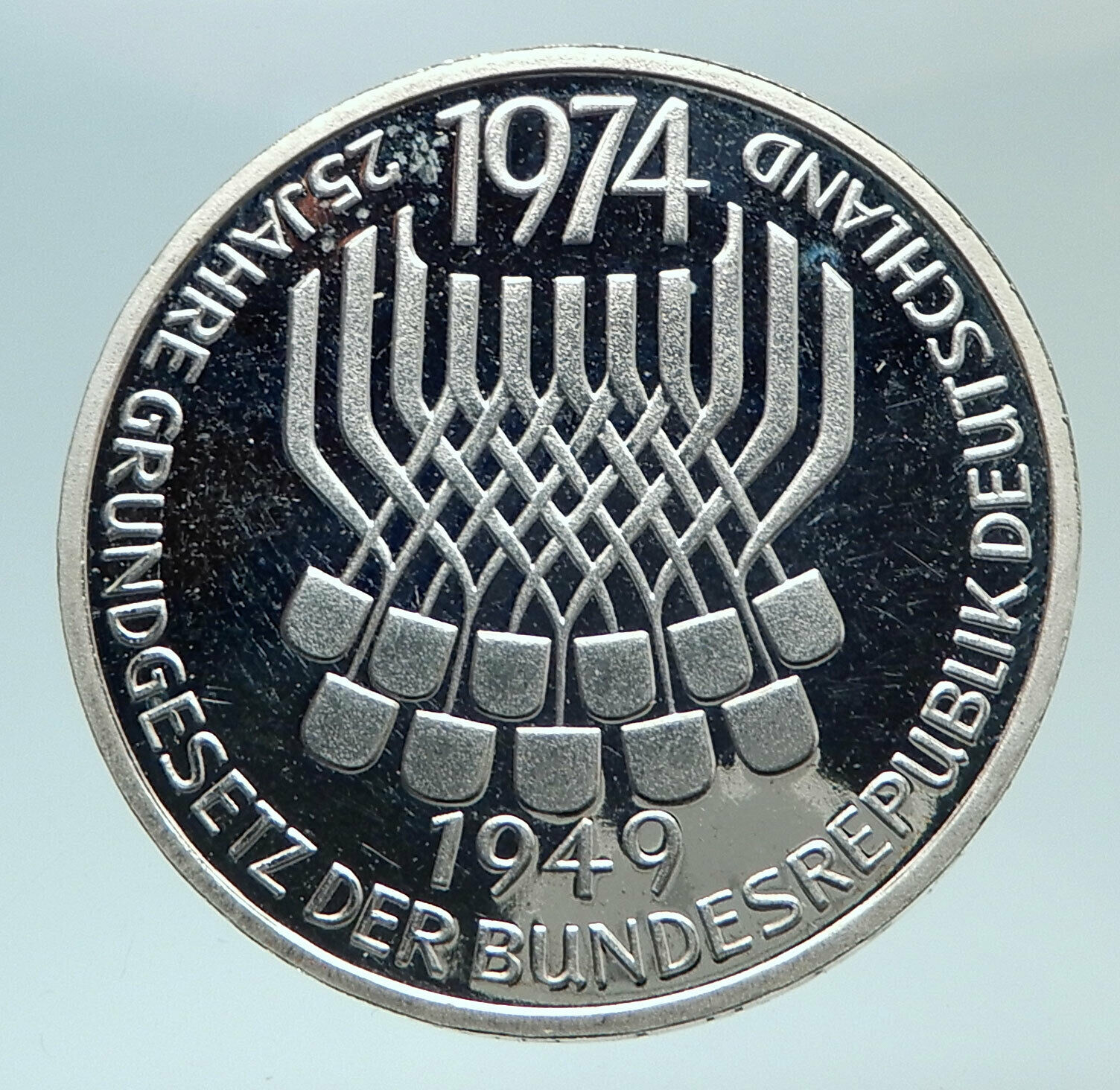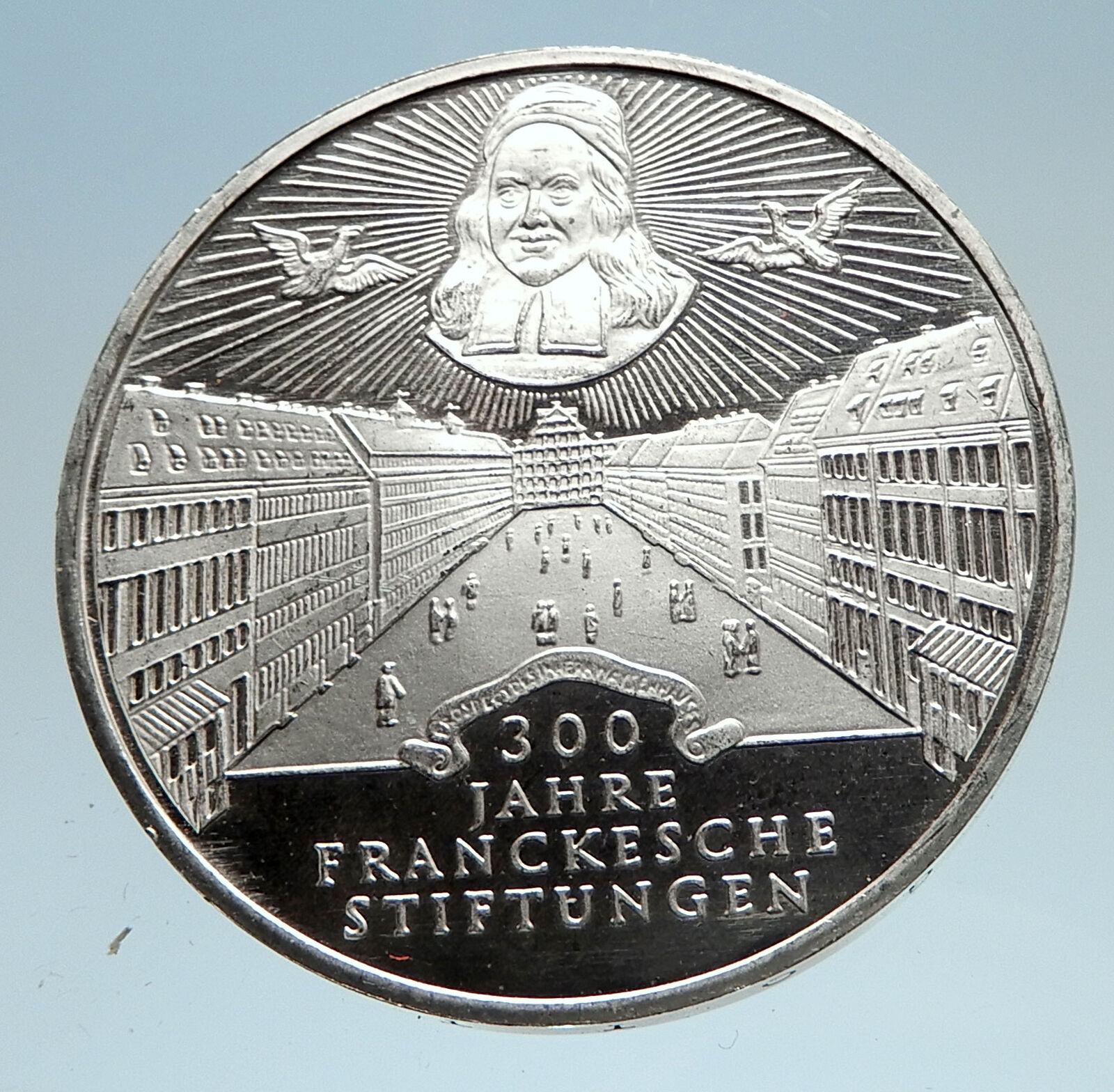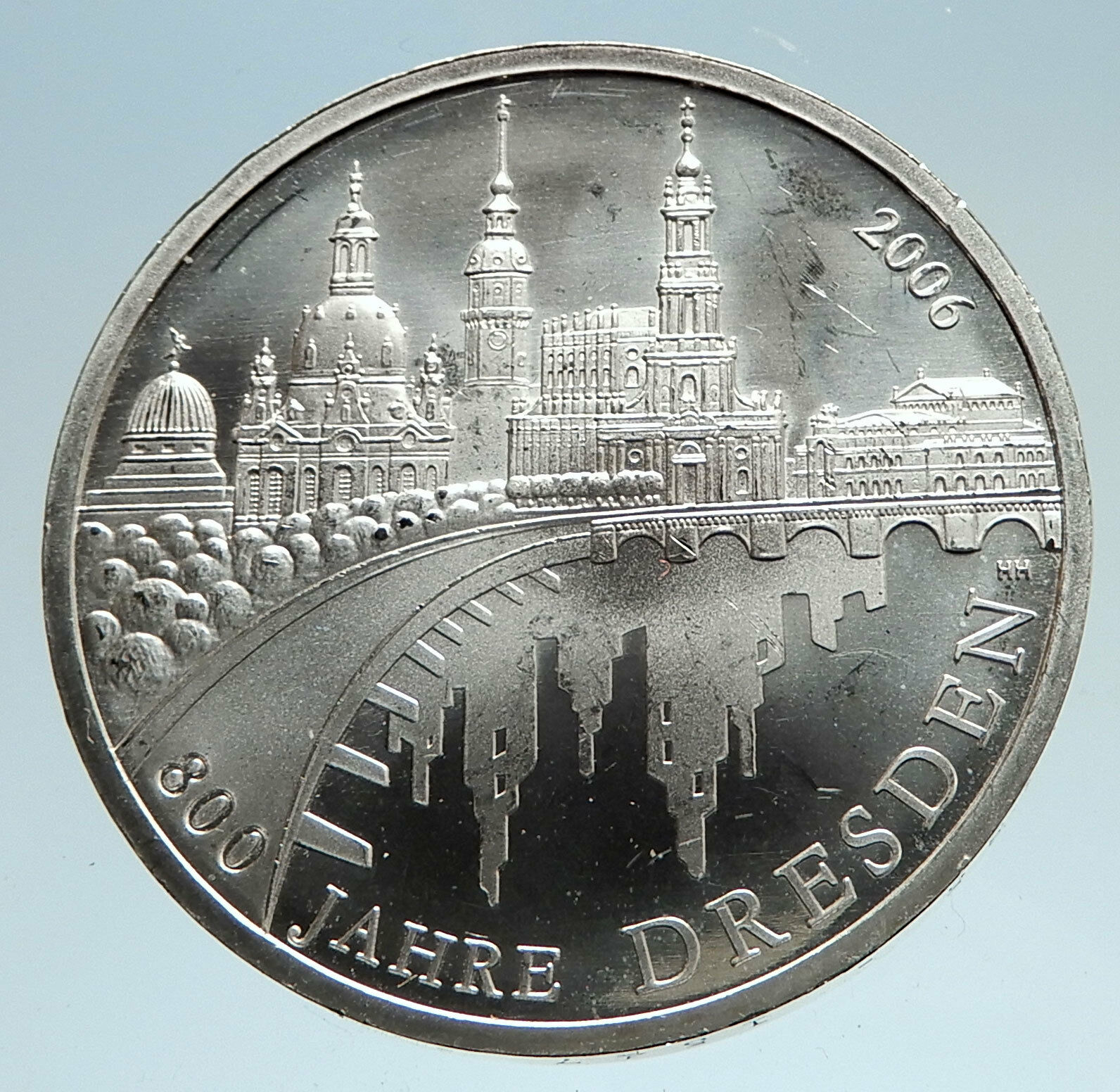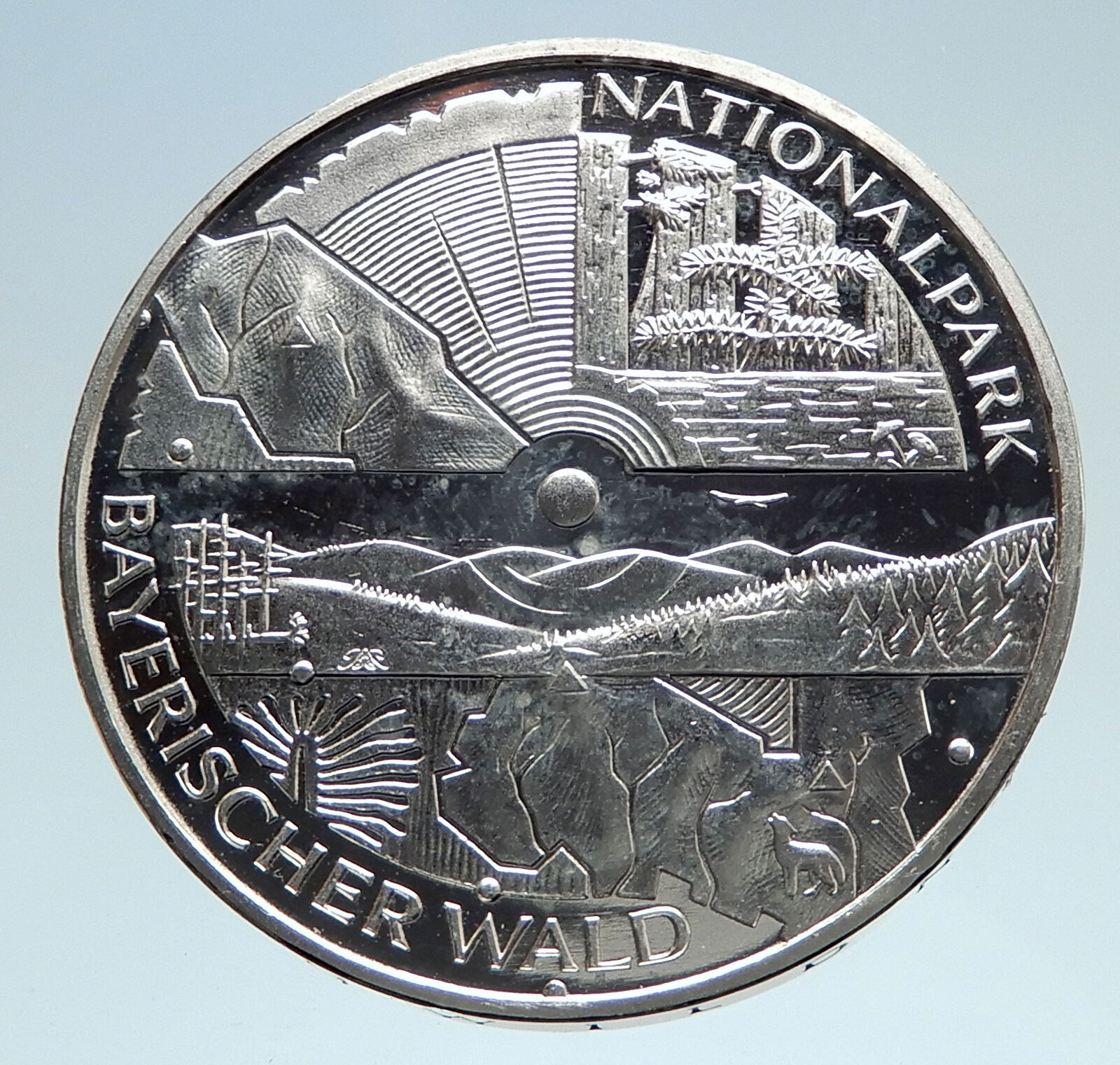|
Germany – 2000th Anniversary of the City of Bonn
1989 Silver 10 Marks 32mm (15.40 grams) 0.625 Silver (0.3115 oz. ASW)
Reference: KM# 172, J# 447, Schön# 171 | Engraver: Paul Effert
BUNDESREPUBLIK DEUTSCHLAND 1989 10 DEUTSCHE MARK D, An eagle, emblem of the German Federal Republic.
2000 JAHRE BONN, Roman tombstone.
Edge Lettering:
BONN BLÜHE UND BLEIBE
You are bidding on the exact item pictured, provided with a Certificate of Authenticity and Lifetime Guarantee of Authenticity.
  The Federal city of Bonn is a city on the banks of the Rhine in the German state of North Rhine-Westphalia, with a population of over 300,000. About 24 km (15 mi) south-southeast of Cologne, Bonn is in the southernmost part of the Rhine-Ruhr region, Germany’s largest metropolitan area, with over 11 million inhabitants. It is famously known as the birthplace of Ludwig van Beethoven in 1770. He spent his childhood and teenage years in Bonn. The Federal city of Bonn is a city on the banks of the Rhine in the German state of North Rhine-Westphalia, with a population of over 300,000. About 24 km (15 mi) south-southeast of Cologne, Bonn is in the southernmost part of the Rhine-Ruhr region, Germany’s largest metropolitan area, with over 11 million inhabitants. It is famously known as the birthplace of Ludwig van Beethoven in 1770. He spent his childhood and teenage years in Bonn.
Founded in the 1st century BC as a Roman settlement, Bonn is one of Germany’s oldest cities. From 1597 to 1794, Bonn was the capital of the Electorate of Cologne, and residence of the Archbishops and Prince-electors of Cologne. From 1949 to 1990, Bonn was the capital of West Germany, and Germany’s present constitution, the Basic Law, was declared in the city in 1949. The era when Bonn served as the capital of West Germany is referred to by historians as the Bonn Republic. From 1990 to 1999, Bonn served as the seat of government – but no longer capital – of reunited Germany.
 Because of a political compromise following the reunification, the German federal government maintains a substantial presence in Bonn. Roughly a third of all ministerial jobs are located in Bonn as of 2019, and the city is considered a second, unofficial, capital of the country. Bonn is the secondary seat of the President, the Chancellor, the Bundesrat and the primary seat of six federal government ministries and twenty federal authorities. The title of Federal City (German: Bundesstadt) reflects its important political status within Germany. Because of a political compromise following the reunification, the German federal government maintains a substantial presence in Bonn. Roughly a third of all ministerial jobs are located in Bonn as of 2019, and the city is considered a second, unofficial, capital of the country. Bonn is the secondary seat of the President, the Chancellor, the Bundesrat and the primary seat of six federal government ministries and twenty federal authorities. The title of Federal City (German: Bundesstadt) reflects its important political status within Germany.
The headquarters of Deutsche Post DHL and Deutsche Telekom, both DAX-listed corporations, are in Bonn. The city is home to the University of Bonn and a total of 20 United Nations institutions, the highest number in all of Germany. These institutions include the headquarters for Secretariat of the UN Framework Convention Climate Change (UNFCCC), the Secretariat of the UN Convention to Combat Desertification (UNCCD), and the UN Volunteers programme.
 Germany, officially the Federal Republic of Germany is a federal parliamentary republic in western-central Europe. It includes 16 constituent states and covers an area of 357,021 square kilometres (137,847 sq mi) with a largely temperate seasonal climate. Its capital and largest city is Berlin. With 81 million inhabitants, Germany is the most populous member state in the European Union. After the United States, it is the second most popular migration destination in the world. Germany, officially the Federal Republic of Germany is a federal parliamentary republic in western-central Europe. It includes 16 constituent states and covers an area of 357,021 square kilometres (137,847 sq mi) with a largely temperate seasonal climate. Its capital and largest city is Berlin. With 81 million inhabitants, Germany is the most populous member state in the European Union. After the United States, it is the second most popular migration destination in the world.
 Various Germanic tribes have occupied northern Germany since classical antiquity. A region named Germania was documented before 100 CE. During the Migration Period the Germanic tribes expanded southward. Beginning in the 10th century, German territories formed a central part of the Holy Roman Empire. During the 16th century, northern German regions became the centre of the Protestant Reformation. Various Germanic tribes have occupied northern Germany since classical antiquity. A region named Germania was documented before 100 CE. During the Migration Period the Germanic tribes expanded southward. Beginning in the 10th century, German territories formed a central part of the Holy Roman Empire. During the 16th century, northern German regions became the centre of the Protestant Reformation.
The rise of Pan-Germanism inside the German Confederation resulted in the unification of most of the German states in 1871 into the Prussian-dominated German Empire. After World War I and the German Revolution of 1918-1919, the Empire was replaced by the parliamentary Weimar Republic. The establishment of the Third Reich in 1933 led to World War II and the Holocaust. After 1945, Germany split into two states, East Germany and West Germany. In 1990, the country was reunified.
 In the 21st century, Germany is a great power and has the world’s fourth-largest economy by nominal GDP, as well as the fifth-largest by PPP. As a global leader in several industrial and technological sectors, it is both the world’s third-largest exporter and importer of goods. Germany is a developed country with a very high standard of living sustained by a skilled and productive society. It upholds a social security and universal health care system, environmental protection and a tuition free university education. In the 21st century, Germany is a great power and has the world’s fourth-largest economy by nominal GDP, as well as the fifth-largest by PPP. As a global leader in several industrial and technological sectors, it is both the world’s third-largest exporter and importer of goods. Germany is a developed country with a very high standard of living sustained by a skilled and productive society. It upholds a social security and universal health care system, environmental protection and a tuition free university education.
Germany was a founding member of the European Union in 1993. It is part of the Schengen Area, and became a co-founder of the Eurozone in 1999. Germany is a member of the United Nations, NATO, the G8, the G20, and the OECD. The national military expenditure is the 9th highest in the world. Known for its rich cultural history, Germany has been continuously the home of influential artists, philosophers, musicians, sportsmen, entrepreneurs, scientists and inventors.
|






 The Federal city of Bonn is a city on the banks of the Rhine in the German state of North Rhine-Westphalia, with a population of over 300,000. About 24 km (15 mi) south-southeast of Cologne, Bonn is in the southernmost part of the Rhine-Ruhr region, Germany’s largest metropolitan area, with over 11 million inhabitants. It is famously known as the birthplace of Ludwig van Beethoven in 1770. He spent his childhood and teenage years in Bonn.
The Federal city of Bonn is a city on the banks of the Rhine in the German state of North Rhine-Westphalia, with a population of over 300,000. About 24 km (15 mi) south-southeast of Cologne, Bonn is in the southernmost part of the Rhine-Ruhr region, Germany’s largest metropolitan area, with over 11 million inhabitants. It is famously known as the birthplace of Ludwig van Beethoven in 1770. He spent his childhood and teenage years in Bonn.  Because of a political compromise following the reunification, the German federal government maintains a substantial presence in Bonn. Roughly a third of all ministerial jobs are located in Bonn as of 2019, and the city is considered a second, unofficial, capital of the country. Bonn is the secondary seat of the President, the Chancellor, the Bundesrat and the primary seat of six federal government ministries and twenty federal authorities. The title of Federal City (German: Bundesstadt) reflects its important political status within Germany.
Because of a political compromise following the reunification, the German federal government maintains a substantial presence in Bonn. Roughly a third of all ministerial jobs are located in Bonn as of 2019, and the city is considered a second, unofficial, capital of the country. Bonn is the secondary seat of the President, the Chancellor, the Bundesrat and the primary seat of six federal government ministries and twenty federal authorities. The title of Federal City (German: Bundesstadt) reflects its important political status within Germany.  Germany, officially the Federal Republic of Germany is a federal parliamentary republic in western-central Europe. It includes 16 constituent states and covers an area of 357,021 square kilometres (137,847 sq mi) with a largely temperate seasonal climate. Its capital and largest city is Berlin. With 81 million inhabitants, Germany is the most populous member state in the European Union. After the United States, it is the second most popular migration destination in the world.
Germany, officially the Federal Republic of Germany is a federal parliamentary republic in western-central Europe. It includes 16 constituent states and covers an area of 357,021 square kilometres (137,847 sq mi) with a largely temperate seasonal climate. Its capital and largest city is Berlin. With 81 million inhabitants, Germany is the most populous member state in the European Union. After the United States, it is the second most popular migration destination in the world. Various Germanic tribes have occupied northern Germany since classical antiquity. A region named Germania was documented before 100 CE. During the Migration Period the Germanic tribes expanded southward. Beginning in the 10th century, German territories formed a central part of the Holy Roman Empire. During the 16th century, northern German regions became the centre of the Protestant Reformation.
Various Germanic tribes have occupied northern Germany since classical antiquity. A region named Germania was documented before 100 CE. During the Migration Period the Germanic tribes expanded southward. Beginning in the 10th century, German territories formed a central part of the Holy Roman Empire. During the 16th century, northern German regions became the centre of the Protestant Reformation. In the 21st century, Germany is a great power and has the world’s fourth-largest economy by nominal GDP, as well as the fifth-largest by PPP. As a global leader in several industrial and technological sectors, it is both the world’s third-largest exporter and importer of goods. Germany is a developed country with a very high standard of living sustained by a skilled and productive society. It upholds a social security and universal health care system, environmental protection and a tuition free university education.
In the 21st century, Germany is a great power and has the world’s fourth-largest economy by nominal GDP, as well as the fifth-largest by PPP. As a global leader in several industrial and technological sectors, it is both the world’s third-largest exporter and importer of goods. Germany is a developed country with a very high standard of living sustained by a skilled and productive society. It upholds a social security and universal health care system, environmental protection and a tuition free university education.




